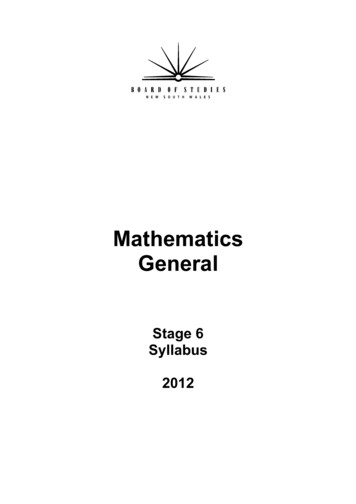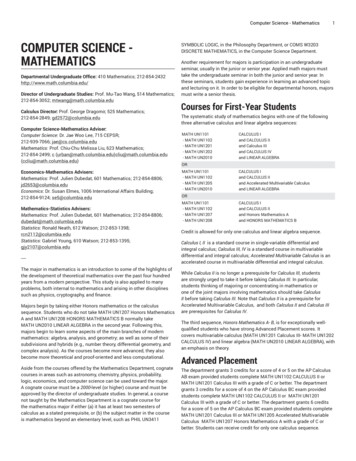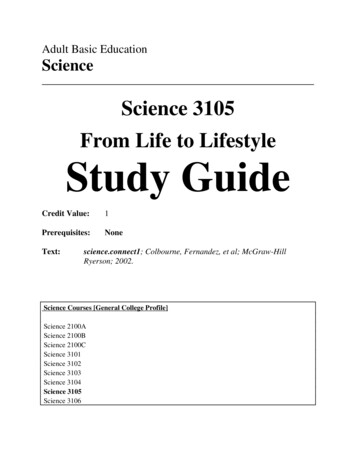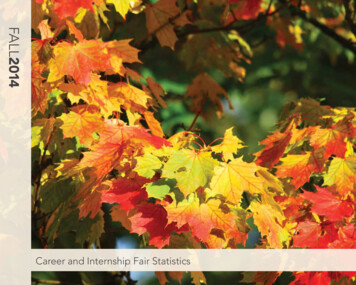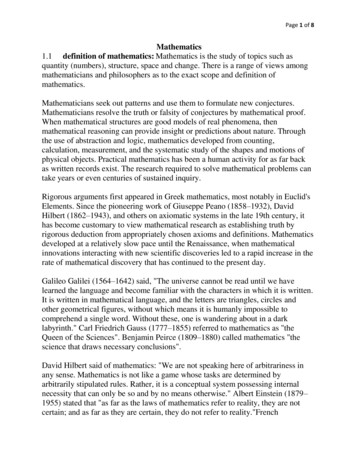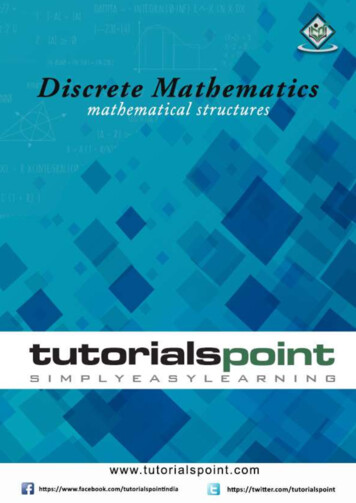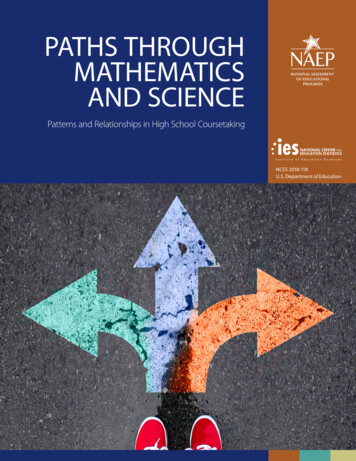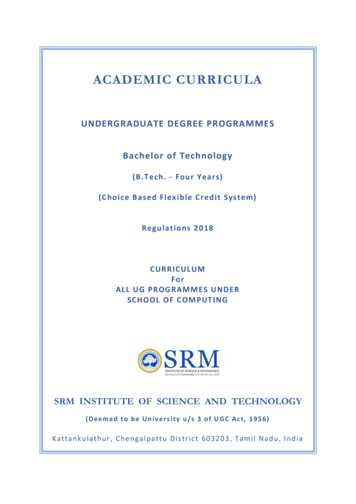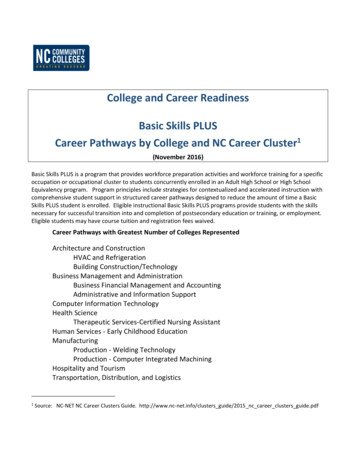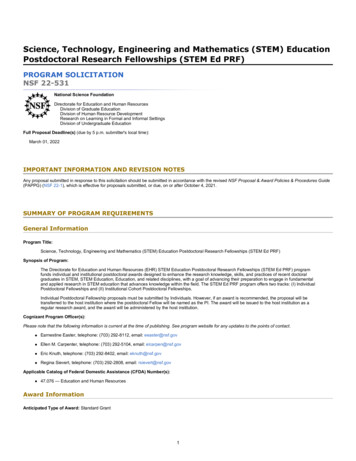
Transcription
Science, Technology, Engineering and Mathematics (STEM) EducationPostdoctoral Research Fellowships (STEM Ed PRF)PROGRAM SOLICITATIONNSF 22-531National Science FoundationDirectorate for Education and Human ResourcesDivision of Graduate EducationDivision of Human Resource DevelopmentResearch on Learning in Formal and Informal SettingsDivision of Undergraduate EducationFull Proposal Deadline(s) (due by 5 p.m. submitter's local time):March 01, 2022IMPORTANT INFORMATION AND REVISION NOTESAny proposal submitted in response to this solicitation should be submitted in accordance with the revised NSF Proposal & Award Policies & Procedures Guide(PAPPG) (NSF 22-1), which is effective for proposals submitted, or due, on or after October 4, 2021.SUMMARY OF PROGRAM REQUIREMENTSGeneral InformationProgram Title:Science, Technology, Engineering and Mathematics (STEM) Education Postdoctoral Research Fellowships (STEM Ed PRF)Synopsis of Program:The Directorate for Education and Human Resources (EHR) STEM Education Postdoctoral Research Fellowships (STEM Ed PRF) programfunds individual and institutional postdoctoral awards designed to enhance the research knowledge, skills, and practices of recent doctoralgraduates in STEM, STEM Education, Education, and related disciplines, with a goal of advancing their preparation to engage in fundamentaland applied research in STEM education that advances knowledge within the field. The STEM Ed PRF program offers two tracks: (I) IndividualPostdoctoral Fellowships and (II) Institutional Cohort Postdoctoral Fellowships.Individual Postdoctoral Fellowship proposals must be submitted by Individuals. However, if an award is recommended, the proposal will betransferred to the host institution where the postdoctoral Fellow will be named as the PI. The award will be issued to the host institution as aregular research award, and the award will be administered by the host institution.Cognizant Program Officer(s):Please note that the following information is current at the time of publishing. See program website for any updates to the points of contact.Earnestine Easter, telephone: (703) 292-8112, email: eeaster@nsf.govEllen M. Carpenter, telephone: (703) 292-5104, email: elcarpen@nsf.govEric Knuth, telephone: (703) 292-8402, email: eknuth@nsf.govRegina Sievert, telephone: (703) 292-2808, email: rsievert@nsf.govApplicable Catalog of Federal Domestic Assistance (CFDA) Number(s):47.076 --- Education and Human ResourcesAward InformationAnticipated Type of Award: Standard Grant1
Estimated Number of Awards: 1 to 146 -10 Individual Postdoctoral Fellowship Awards, 2 - 4 Institutional Cohort Postdoctoral Fellowship AwardsAnticipated Funding Amount: 8,000,000Pending availability of funds, NSF anticipates approximately 8,000,000 will be available for the FY2022 competition.Funds will be awarded as follows: (1) Individual Postdoctoral Fellowship awards up to 300,000 with a duration of up to 24 months ( 150,000 maximumannually); and (2) Institutional Cohort Postdoctoral Fellowship awards up to 1,250,000 for awards to single institutions or up to 2,500,000 for awards tocollaborating institutions, with a duration of up to 36 months. Consistent with Individual Postdoctoral Fellowships, Institutional Cohort Postdoctoral Fellowshipawards must allocate a 70,000 salary per postdoctoral fellow annually with a duration of up to two years.Eligibility InformationWho May Submit Proposals:Proposals may only be submitted by the following:NSF STEM Education Postdoctoral Research Fellowships proposals may be submitted by individuals (Individual PostdoctoralFellowship); or by single institutions or a collaboration of institutions (Institutional Cohort Postdoctoral Fellowship). Proposals may besubmitted only by the following entities.Individual Postdoctoral Fellowship proposers must meet the following eligibility requirements:Be a U.S. citizen, national, or legally admitted permanent resident alien of the United States as of the proposal deadline,Hold a doctoral degree in a field of science, technology, engineering, or mathematics (STEM), STEM Education, Education,or a related discipline earned no more than 24 months before the proposal deadline or will earn such a degree within 10months after the proposal deadline,Must not hold a tenure-track position, andMust not have submitted the same fellowship proposal concurrently to another NSF program or to a similar program inanother Federal agency.Individual Postdoctoral Fellowship proposals are submitted directly by the fellowship proposer to NSF. Each fellowship proposer mustaffiliate with a sponsoring STEM education researcher and host institution (with whom the sponsor is affiliated) at the time of proposalsubmission. Appropriate host institutions include:Institutions of Higher Education (IHEs) Two-and-four-year IHEs (including community colleges), accredited in, and having acampus located in the U.S., acting on behalf of their faculty members.Non-profit, Non-academic organizations - Independent museums, observatories, research laboratories, professionalsocieties and other similar organizations located in the U.S. that are directly associated with educational or researchactivities.Individual fellowship proposers are encouraged to propose host institutions that differ from the institution that awarded their doctorateto broaden their professional networks and experiences. Proposers who are women, veterans, persons with disabilities, and/or othermembers of groups underrepresented in STEM education research, or who have attended community colleges or Minority-ServingInstitutions (Historically Black Colleges and Universities, Tribal Colleges and Universities, Alaska Native -Serving Institutions, NativeHawaiian-Serving Institutions, Predominantly Black Institutions, Asian American and Pacific Islander-Serving Institutions, NativeAmerican-Serving Non-Tribal Institutions, and Hispanic-Serving Institutions) are especially encouraged to apply.Proposals that fail to meet the above eligibility requirements will be returned without review.By signing and submitting the proposal, the fellowship proposer is certifying that the proposer meets the eligibility criteria specified inthis program solicitation. Willful provision of false information in this request and its supporting documents or in reports required underan ensuing award is a criminal offense (U.S. Code, Title 18, Section 1001).Institutional Cohort Postdoctoral Fellowship proposers (single and collaborative) must meet the following eligibility requirements:Institutions of Higher Education (IHEs) Two-and-four-year IHEs (including community colleges), accredited in, and having acampus located in the U.S., acting on behalf of their faculty members.Non-profit, Non-academic organizations - Independent museums, observatories, research laboratories, professionalsocieties and other similar organizations located in the U.S. that are directly associated with educational or researchactivities.Proposals for Institutional Cohort Postdoctoral Fellowships from or including partnerships with Minority Serving Institutions (MSIs)and institutions located within EPSCoR jurisdictions are encouraged.Who May Serve as PI:For Individual Postdoctoral Fellowships, proposers must have earned a doctoral degree in STEM, STEM Education, Education, or a relateddiscipline no more than 24 months prior to the proposal deadline or will earn such a degree within 10 months after the application deadline andmust not hold a tenure-track position. If an award is recommended, the Fellowship proposal will be transferred to the proposed host institutionwhere the Postdoctoral Fellow will be named as the PI.For Institutional Cohort Postdoctoral Fellowships, PIs must hold full-time positions at the lead institution as associate or full professors (ortheir equivalent), in STEM, STEM Education, Education, or a related discipline with a research emphasis in STEM education. Full-timeacademic or research faculty members from partner (secondary) institutions or those who hold senior positions at non-profit, non-academicorganizations, such as museums and similar organizations in the United States associated with STEM education and/or STEM education2
research activities, may be named as co-PIs.Limit on Number of Proposals per Organization: 1Each institution may be named in only one Institutional Cohort Postdoctoral Fellowship proposal per competition, in either a single institutionalor collaborative institutional proposal. There are no restrictions on the number of Individual Postdoctoral Fellowship proposers that anorganization may host.Limit on Number of Proposals per PI or co-PI: 1Proposers for Individual Postdoctoral Fellowships may submit only one STEM Ed PRF proposal per competition. Likewise, for InstitutionalCohort Postdoctoral Fellowship proposals, PIs are limited to one per competition.Proposal Preparation and Submission InstructionsA. Proposal Preparation InstructionsLetters of Intent: Not requiredPreliminary Proposal Submission: Not requiredFull Proposals:Full Proposals submitted via FastLane: NSF Proposal and Award Policies and Procedures Guide (PAPPG) guidelines apply. The completetext of the PAPPG is available electronically on the NSF website at: https://www.nsf.gov/publications/pub summ.jsp?ods key pappg.Full Proposals submitted via Grants.gov: NSF Grants.gov Application Guide: A Guide for the Preparation and Submission of NSF Applicationsvia Grants.gov guidelines apply (Note: The NSF Grants.gov Application Guide is available on the Grants.gov website and on the NSF websiteat: https://www.nsf.gov/publications/pub summ.jsp?ods key grantsgovguide).B. Budgetary InformationCost Sharing Requirements:Inclusion of voluntary committed cost sharing is prohibited.Indirect Cost (F&A) Limitations:Not ApplicableOther Budgetary Limitations:Other budgetary limitations apply. Please see the full text of this solicitation for further information.C. Due DatesFull Proposal Deadline(s) (due by 5 p.m. submitter's local time):March 01, 2022Proposal Review Information CriteriaMerit Review Criteria:National Science Board approved criteria. Additional merit review criteria apply. Please see the full text of this solicitation for further information.Award Administration InformationAward Conditions:Additional award conditions apply. Please see the full text of this solicitation for further information.Reporting Requirements:Standard NSF reporting requirements apply.TABLE OF CONTENTSSummary of Program RequirementsI. IntroductionII. Program Description3
III. Award InformationIV. Eligibility InformationV. Proposal Preparation and Submission InstructionsA. Proposal Preparation InstructionsB. Budgetary InformationC. Due DatesD. FastLane/Grants.gov RequirementsVI. NSF Proposal Processing and Review ProceduresA. Merit Review Principles and CriteriaB. Review and Selection ProcessVII. Award Administration InformationA. Notification of the AwardB. Award ConditionsC. Reporting RequirementsVIII. Agency ContactsIX. Other InformationI. INTRODUCTIONThe Directorate for Education and Human Resources (EHR) STEM Education Postdoctoral Research Fellowships (STEM Ed PRF) program funds individual andinstitutional postdoctoral projects designed to enhance the research knowledge, skills, and practices of recent doctoral graduates in STEM, STEM Education,Education, and related disciplines, with a goal of advancing their preparation to engage in fundamental and applied research in STEM education that advancesknowledge within the field. STEM Ed PRF awards support opportunities for fellows to engage in ongoing research, develop independent research, participate inprofessional development under the guidance of experienced mentors, and collaborate with other professionals in the STEM Education research community.Individual Fellows must affiliate with appropriate host institutions and are expected to devote themselves full time to the fellowship activities for the duration ofthe fellowship.II. PROGRAM DESCRIPTIONTo realize its identified goals of promoting discovery, learning, research infrastructure and stewardship, NSF supports projects judged as promising to “advancethe frontiers of knowledge, cultivate a world-class, broadly inclusive science and engineering workforce and expand the scientific literacy of all citizens, build thenation's research capability through investments in advanced instrumentation and facilities, and support excellence in science and engineering research andeducation through a capable and responsive organization” (https://www.nsf.gov/about/glance.jsp). Working towards the particular objective of furthering theNation’s ability to develop an effective STEM workforce requires high-quality STEM education informed by robust STEM education research. The STEM Ed PRFprogram directly aligns with this work by funding projects designed to build STEM education research capacity and advance knowledge in STEM education.The STEM Ed PRF program offers two tracks of fellowship opportunities for recent doctoral graduates: Track I - Individual Postdoctoral Fellowships and Track IIInstitutional Cohort Postdoctoral Fellowships. For both tracks, the program encourages proposals to support postdoctoral experiences for those holdingdoctorates in STEM education research as well as those who have earned doctorates in STEM, STEM Education, Education, and related disciplines who havecareer interests in STEM education research. The Individual Postdoctoral Fellowships (Track I) provide an opportunity for recent doctoral graduates in thesedisciplines to receive training and mentorship under the direction of a sponsoring STEM education researcher(s) from a host institution. The Institutional CohortPostdoctoral Fellowships (Track II) provide an opportunity for institutions to design a postdoctoral training and mentorship program and host a cohort of recentdoctoral graduates in these disciplines.As part of NSF’s goal to cultivate an inclusive world-class STEM workforce, the STEM Ed PRF program encourages proposals with a focus on broadening theparticipation of women and people who are members of groups underrepresented in the STEM workforce. The program affords multiple opportunities forbroadening participation, including providing support for fellows who are members of groups underrepresented in STEM, supporting the involvement of MSIs inSTEM education research, and funding projects that support fellows conducting research on broadening participation in STEM. Principal Investigators areencouraged to incorporate findings from the broadening participation literature in the design of their proposed projects as relevant. Examples includecustomizing research-based postdoctoral experiences that address the unique experiences of fellows who are members of groups underrepresented in STEM toensure their retention and development as STEM education researchers and designing innovative higher-education consortia that include community collegesand/or MSIs as integral partners in the project.Given the priorities outlined in the previous paragraphs, proposers should note that additional review criteria for evaluating the merit of proposals submitted tothe STEM Ed PRF program will include the participation of women and persons from groups underrepresented in STEM in project designs; the inclusion ofMSIs, community colleges, and institutions within EPSCoR jurisdictions in significant project roles and evidence of the appropriateness of project designs inmeeting the unique needs of these groups and institutions. For a list of the criteria reviewers will use in assessing the merits of proposals submitted in responseto this solicitation, please refer to section VI.A of this document.Track 1: Individual Postdoctoral FellowshipsIndividual Postdoctoral Fellowships (Track I) provide funds to support an individual working full-time as a postdoctoral fellow at a host institution for up to 24months. The fellowship proposer must identify a sponsoring STEM education researcher who will provide mentoring and training proposed by the fellowshipcandidate and a host institution (with whom the sponsoring researcher is affiliated) at the time of proposal submission. The proposer is responsible for makingprior arrangements with the sponsoring researcher and host institution. The fellowship proposal must include a mentoring plan and statement that attests to anenvironment prepared to support the fellowship activities. The history, resources, and potential of the sponsoring researcher and host institution for supportingthe development of STEM education researchers will be considered in judging the merits of the proposal. To broaden their professional experiences andnetworks, proposers are encouraged to identify host institutions that differ from their doctorate-granting institution. If awarded a fellowship, the fellow is expectedto remain affiliated with the host institution and sponsoring researcher for the entire tenure of their fellowship.4
Documentation required from host institutions is described in Section V below. The host institution's letter must specifically acknowledge that the institution willaccept responsibility for administering the award and that the Fellow will be named as the PI on the award and receive salary and benefits as an institutionalemployee.Track 2: Institutional Cohort Postdoctoral FellowshipsProposers for Institutional Cohort Postdoctoral Fellowships (Track II) may be an individual institution of higher education or a collaborative of multiple institutions(up to three institutions, including the lead institution). The primary (lead) institution must be accredited and include an active STEM education research programand experts prepared to actively mentor postdoctoral fellows. For collaborations of multiple institutions, the secondary (collaborating) institutions must beaccredited two-year, four-year, or graduate-level institutions of higher education (including community colleges) or can be non-profit, non-academicorganizations engaged in STEM education and/or STEM education research activities. While not all collaborating institutions must host a fellow or fellows, allinstitutions should have a substantive role and contribute significant value to the proposed project.III. AWARD INFORMATIONPending availability of funds, NSF anticipates approximately 8,000,000 will be available for the FY2022 competition.Funds will be awarded as follows: (1) Individual Postdoctoral Fellowship awards up to 300,000 with a duration of up to 24 months ( 150,000 maximumannually); and (2) Institutional Cohort Postdoctoral Fellowship awards up to 1,250,000 for awards to single institutions or up to 2,500,000 for awards tocollaborating institutions, with a duration of up to 36 months. Consistent with Individual Postdoctoral Fellowships, Institutional Cohort Postsecondary Fellowshipsawards must allocate a salary of 70,000 per postdoctoral fellow annually with a duration of up to two years.Individual Postdoctoral Fellowship proposals must be submitted by the individual seeking a postdoctoral fellowship. If support for the Individual PostdoctoralFellowship award is recommended, it will be transferred to the host institution as a regular research award and administered by the host institution, with thepostdoctoral fellow named as the PI.Within the fellowship period, one month per year of fellowship duration may be used for paid leave, including parental or family leave. The paid leave cannot beused to increase the level of NSF support beyond the duration of the fellowship. NSF enables career-life balance through a variety of mechanisms. For moreinformation, see s selected to receive fellowship awards will be contacted by the NSF and asked to provide additional information, such as forms required for a preaward transfer to the host institution. Successful applicants who have not completed the PhD at the time of proposal submission must provide certification of thecompletion of PHD degree requirements before the start of the fellowship activities.Fellowships are not renewable and are subject to the availability of funds.During the period of the fellowship, no additional appointment or fellowship may be held without prior permission of the cognizant NSF program officer.If a Fellow chooses to accept a tenure-track position or other employment during the first year of the Fellowship, the fellowship award will be terminated upon thestart of the new position. In such cases, the host institution is responsible for initiating procedures for a termination by mutual agreement in accordance withChapter XII of the NSF PAPPG. Fellows are encouraged to consult the cognizant program officer if they choose to accept a tenure-track position or otheremployment during the second year of the Fellowship.Pre-Award Transfer Process: To process the Pre-award Proposal Transfer, the Fellow, acting as the original proposing organization's AuthorizedOrganizational Representative (AOR), must submit to the cognizant Program Officer (PO) an e-mail concurring with the transfer of the proposal to the hostinstitution. This documentation will be added to the files by the PO as correspondence associated with the proposal. The cognizant PO then will request that thehost institution's Sponsored Projects Office submit to NSF a revised:Cover Sheet (with the Fellow named as the PI) and Certification pages signed by the AOR; andBudget and Budget Justification. The Fellow must be named as the PI and must receive a monthly or bi-weekly salary of 70,000 per year plusinstitutional employee benefits. The host institution's budget is expected to include fringe benefit costs for the Fellow. The 80,000 per year for researchcosts may be distributed in the budget to cover fringe benefits and other direct research costs, including but not limited to, materials and supplies,equipment, computing resources, access to databases, domestic and international travel, publication charges, and subscription fees. The applicableU.S. Federally negotiated indirect cost rate(s) must be used in computing indirect costs (F&A). Organizations that do not have a current negotiated rateagreement with a cognizant Federal agency may request indirect cost recovery up to the de minimis rate of 10% of modified total direct costs.The PO will update the proposal system with the new organizational and budget data so that processing of the proposal award to the host institution canproceed. The Fellow's original Cover Sheet and Certification pages will not be modified and will be retained for the historical record of how the proposal wassubmitted to NSF.IV. ELIGIBILITY INFORMATIONWho May Submit Proposals:Proposals may only be submitted by the following:NSF STEM Education Postdoctoral Research Fellowships proposals may be submitted by individuals (Individual PostdoctoralFellowship); or by single institutions or a collaboration of institutions (Institutional Cohort Postdoctoral Fellowship). Proposals may besubmitted only by the following entities.Individual Postdoctoral Fellowship proposers must meet the following eligibility requirements:5
Be a U.S. citizen, national, or legally admitted permanent resident alien of the United States as of the proposal deadline,Hold a doctoral degree in a field of science, technology, engineering, or mathematics (STEM), STEM Education, Education,or a related discipline earned no more than 24 months before the proposal deadline or will earn such a degree within 10months after the proposal deadline,Must not hold a tenure-track position, andMust not have submitted the same fellowship proposal concurrently to another NSF program or to a similar program inanother Federal agency.Individual Postdoctoral Fellowship proposals are submitted directly by the fellowship proposer to NSF. Each fellowship proposer mustaffiliate with a sponsoring STEM education researcher and host institution (with whom the sponsor is affiliated) at the time of proposalsubmission. Appropriate host institutions include:Institutions of Higher Education (IHEs) Two-and-four-year IHEs (including community colleges), accredited in, and having acampus located in the U.S., acting on behalf of their faculty members.Non-profit, Non-academic organizations - Independent museums, observatories, research laboratories, professionalsocieties and other similar organizations located in the U.S. that are directly associated with educational or researchactivities.Individual fellowship proposers are encouraged to propose host institutions that differ from the institution that awarded their doctorateto broaden their professional networks and experiences. Proposers who are women, veterans, persons with disabilities, and/or othermembers of groups underrepresented in STEM education research, or who have attended community colleges or Minority-ServingInstitutions (Historically Black Colleges and Universities, Tribal Colleges and Universities, Alaska Native -Serving Institutions, NativeHawaiian-Serving Institutions, Predominantly Black Institutions, Asian American and Pacific Islander-Serving Institutions, NativeAmerican-Serving Non-Tribal Institutions, and Hispanic-Serving Institutions) are especially encouraged to apply.Proposals that fail to meet the above eligibility requirements will be returned without review.By signing and submitting the proposal, the fellowship proposer is certifying that the proposer meets the eligibility criteria specified inthis program solicitation. Willful provision of false information in this request and its supporting documents or in reports required underan ensuing award is a criminal offense (U.S. Code, Title 18, Section 1001).Institutional Cohort Postdoctoral Fellowship proposers (single and collaborative) must meet the following eligibility requirements:Institutions of Higher Education (IHEs) Two-and-four-year IHEs (including community colleges), accredited in, and having acampus located in the U.S., acting on behalf of their faculty members.Non-profit, Non-academic organizations - Independent museums, observatories, research laboratories, professionalsocieties and other similar organizations located in the U.S. that are directly associated with educational or researchactivities.Proposals for Institutional Cohort Postdoctoral Fellowships from or including partnerships with Minority Serving Institutions (MSIs)and institutions located within EPSCoR jurisdictions are encouraged.Who May Serve as PI:For Individual Postdoctoral Fellowships, proposers must have earned a doctoral degree in STEM, STEM Education, Education, or a relateddiscipline no more than 24 months prior to the proposal deadline or will earn such a degree within 10 months after the application deadline andmust not hold a tenure-track position. If an award is recommended, the Fellowship proposal will be transferred to the proposed host institutionwhere the Postdoctoral Fellow will be named as the PI.For Institutional Cohort Postdoctoral Fellowships, PIs must hold full-time positions at the lead institution as associate or full professors (ortheir equivalent), in STEM, STEM Education, Education, or a related discipline with a research emphasis in STEM education. Full-timeacademic or research faculty members from partner (secondary) institutions or those who hold senior positions at non-profit, non-academicorganizations, such as museums and similar organizations in the United States associated with STEM education and/or STEM educationresearch activities, may be named as co-PIs.Limit on Number of Proposals per Organization: 1Each institution may be named in only one Institutional Cohort Postdoctoral Fellowship proposal per competition, in either a single institutionalor collaborative institutional proposal. There are no restrictions on the number of Individual Postdoctoral Fellowship proposers that anorganization may host.Limit on Number of Proposals per PI or co-PI: 1Proposers for Individual Postdoctoral Fellowships may submit only one STEM Ed PRF proposal per competition. Likewise, for InstitutionalCohort Postdoctoral Fellowship proposals, PIs are limited to one per competition.Additional Eligibility Info:Additional Eligibility Info:For Individual Postdoctoral Fellowships, each Fellowship proposer must identify a sponsoring researcher(s) and must affiliate with a U.S.host institution. Appropriate host institutions include:Institutions of Higher Education (IHEs) Two-and four-year IHEs (including community colleges) accredited in, and having a campuslocated in the U.S., acting on behalf of their faculty members.Non-profit, Non-academic organizations -Independent museums, observatories, research laboratories, professional societies andsimilar organizations located in the U.S. that are directly associated with educational or research activities.If an award is recommended, the proposal will be transferred to the proposed host institution where the postdoctoral Fellow will be named asthe project's PI. The award will be issued to and administered by the host institution. See Section III for additional information about the Pre-6
Award Transfer Process.V. PROPOSAL PREPARATION AND SUBMISSION INSTRUCTIONSA. Proposal Preparation InstructionsFull Proposal Preparation Instructions: Proposers may opt to submit proposals in response to this Program Solicitation via FastLane or Grants.gov.Full proposals submitted via FastLane: Proposals submitted in response to this program solicitation should be prepared and submitted in accordancewith the general guidelines contained in the NSF Proposal & Award Policies & Procedures Guide (PAPPG). The complete text of the PAPPG isavailable electronically on the NSF website at: https://www.nsf.gov/publications/pub summ.jsp?ods key pappg. Paper copies of the PAPPG may beobtained from the NSF Publications Clearinghouse, telephone (703) 292-8134 or by e-mail from nsfpubs@nsf.gov. Proposers are r
Hold a doctoral degree in a field of science, technology, engineering, or mathematics (STEM), STEM Education, Education, or a related discipline earned no more than 24 months before the proposal deadline or will earn such a degree within 10 months after the proposal deadline, Must not hold a tenure-track position, and
